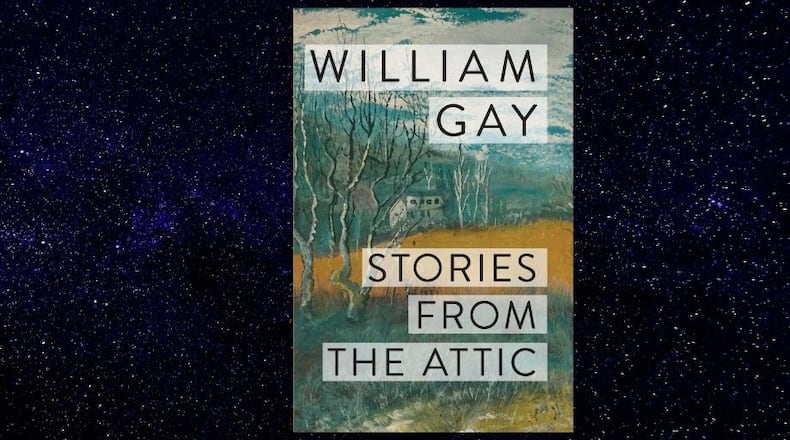The acclaimed Tennessee writer William Gay, who died in 2012, cut a figure as tough and scraggly as the world he describes, a homely place that seems barely hacked out of the woods.
Clouds of desperation motor low on thermals of violence. Bodiless voices become heralds, “faint from the outskirts of death.” Over a trifle, a person might be shot dead and thrown into a limestone pit. “Opportunity only knocks once,” Gay writes, “ruin will kick the door down and barge on in.”
If this sounds dire, it’s frequently disreputable fun. Both tendencies are evident in “Stories from the Attic,” which is precisely the book its title claims it to be: an ensemble of short fiction, memoirs essays and fragments, most of which were discovered by the author’s literary “steward,” J.M. White, in the cobwebbed attic of Gay’s log cabin.
Thanks to “Team Gay,” a devoted coterie of writers, scholars and friends, some based in Atlanta, who have edited his four posthumous novels, “Stories from the Attic” is beautifully put together and well-paced.
The fiction sections track Gay’s artistic path from the 1970s — his period of “lyrical realism,” as White describes it — to the daring, experimental tale he was working on at the end of his life, “The Wreck of the Tennessee Gravy Train,” in which the protagonist is “Ushered down a dream hall” by a “badger save that it walked upright like a man.”
The plots concentrate on impoverished men who hold little advantage. Some, like Bascom, a “Lost and penniless drifter,” are innocuous. In “Riding Off into the Sunset: Starring Gary Cooper,” he wanders into the Star Vue Drive-movie theater seeking employment.
“I been broke all my life and ain’t robbed no bank yet,” Bascom declares.
“Well, you’re young,” says management. “Give yourself time.”
Others are well beyond governance. Hershel Clay, the meandering firebug of “Nighttime Awakening,” “(walks) like a man above snakes, a man who had not been able to fit snakes into his schedule.”
Clay tugs on his “popskull moonshine whiskey,” blackjacking revelers at Goblin’s Knob, the watering hole where the cooler is always “cranked” to pacify, or to fuel, the colorful reprobates of Ackerman’s Field, Gay’s imaginary community central to his oeuvre. (The little town’s churchgoers have rolled-out a sign that offers local sinners a stark choice: ROCK IN SWEET JESUS’ ARMS OR ROAST IN HELL.)
In part, Gay is a deadpan comic writer who can’t restrain a periodical impulse to work blue. “Buddy Bradshaw and the Judge’s Daughter,” a ridiculous piece of country-boy crudity, involves a phallic ear of freshly picked corn, and the gag only goes up from there.
Like a buckskin prophet of yore, Gay summons the America of its distraught frontier. In “The Trace,” one of the greatest action yarns ever, “land pirates” plague 19th century travelers along the Natchez Trace: “There was no law there and there was no God. God had thrown up his hands in disgust and disowned responsibility for any of it.”
With its revealing autobiographical essays and invaluable “Postscript” (an extended roundtable discussion convened by “The Chattahoochee Review” of Georgia State University/Perimeter College), “Stories from the Attic” is an important introduction to the main currents of Gay’s writing and his life.
His home for a time was a “dilapidated single wide trailer,” according to J.M. White, but he was mainly a private, cultivated gentleman who preferred living in the sticks. He spoke in a smoky cadence. He did not own a gun. He published his first book when he was 59 years old, “The Long Home” (1999).
Born between 1939 and 1943 (there is some dispute about the exact year), he grew up, Gay writes, in “sharecropper circumstances” in Hohenwald, a middle Tennessee burg (population 4,000), where he spent the majority of his life. He was compelled early to read and write, though he was too poor to buy either books or compositional materials.
In his very excellent two-part essay “Reading the South,” Gay celebrates his first loves: horror comics, nascent Southern noir and Signet Books, the post-war paperback publisher whose trashy covers (and affordability) lured the inchoate author toward “unserious” and serious literature alike, i.e., from Mickey Spillane to William Faulkner, who became his idol.
For Gay, Faulkner was the bomb and “As I Lay Dying” (1930) “his most fully realized book.” The hill country sage, he contends, wrote about depravity, but “he never denies his characters their basic humanity.”
If Gay was yet an exponent of the high Southern literary tradition, he was an unconventional one, increasingly drawn to the occult and paranormal. He dedicated his second novel, “Provinces of Night” (2000) to William Blake. He wrote a novel about his state’s Bell Witch Legend. His supernatural Gothic thriller “Twilight” (2006) was hailed in spooky-dom by Stephen King, the fright king.
As one colleague puts it, Gay “lived in a writer’s trance.” He often hurls obscure adjectives — “malefic” and “telluric” — like talismans of bone tools into the darkest dark of Ackerman’s Field. If he confronts the sorrows of humanity in his own way, he never loses his grip on the hopes and dreams of everyday people. In “The Homecoming,” a young man named Winer walks away from an unpleasant encounter with a wealthy relative:
“The world he was moving toward seemed infinite in its possibilities, the lives he could lead, the people he could be, limitless and complex. The world was full of places he could go to, people he could meet, emotions he could make his own.”
Thus, the cumulative effect is of greatness.
FICTION
“Stories from the Attic”
by William Gay
Dzanc Books
368 pages, $26.95
About the Author
The Latest
Featured


